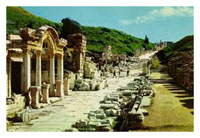 This tour is designed to offer you a complete perspective about Ephesus and the Roman way of living in Ephesus. First visit of the tour will be Ancient City of Ephesus that was built on a small hill, with the entrance located at the top of the hill. Once you enter the Open Air Archeological Museum of Ephesus and pass by the Magnesia gate, you will enter the administrative section of ancient Ephesus. The guided walking tour will take you through one of the most magnificent excavations in the world. See the Odeon, the Fountain of Trajan, the steam baths of Scholastika, temple of Hadrian and the impressive library of Celsius. The library is adorned with columns and statues. The Grand Theater, where St. Paul preached, is one of the largest theaters in antiquity with a capacity of 24,000 seats. This tour is designed to offer you a complete perspective about Ephesus and the Roman way of living in Ephesus. First visit of the tour will be Ancient City of Ephesus that was built on a small hill, with the entrance located at the top of the hill. Once you enter the Open Air Archeological Museum of Ephesus and pass by the Magnesia gate, you will enter the administrative section of ancient Ephesus. The guided walking tour will take you through one of the most magnificent excavations in the world. See the Odeon, the Fountain of Trajan, the steam baths of Scholastika, temple of Hadrian and the impressive library of Celsius. The library is adorned with columns and statues. The Grand Theater, where St. Paul preached, is one of the largest theaters in antiquity with a capacity of 24,000 seats.
You will also visit the Terrace Houses which are located on the slopes of Bulbul Mountain, opposite the Hadrian Temple. Also called “the houses of rich,” they were built for the important and wealthy people of Ephesus, as only rich people could afford such houses. The terrace houses are a Museum inside Ephesus with great engraving, mosaics, sections, floors, representing the life style of the rich Ephesians. You will be given an extra ticket to visit the inner sections of these houses in which the excavations still continue. The most ancient of the houses were built in the first century BC, and most of the houses were restored in the second century AD. The houses seemed plain from outside, but inside they were constructed with the highest standards for their day. They were decorated with mosaics and frescoes, and they had interior courtyards in the center, with open ceiling. To give you an idea about the quality of life in Ephesus, the houses both had cold and hot water. Once all visits are over you will return to the buses through the Arcadian way, where Mark Anthony and Cleopatra once rode in procession.
At the Ephesus Archeological Museum, you’ll be escorted through the 9 exhibits tracing the religious and chronological history of the ancient city. Filled with attractively displayed mosaics, statuary, and other artifacts, the museum exhibits several marble statues of the Mother Goddess Artemis, goddess of nature, childbirth, and the harvest. Combining the information at the Open Air Museum and the Archeology Museum will give you a very fulfilling idea of the city of Ephesus and its importance in the ancient times.
Following the museum visit, you are invited to join a Roman feast in Ephesian style. The Roman feast will be composed of food which pertains to the golden ages of Ephesus which will help you appreciate the life style even more. Ephesians will be happy to greet you and to share with you their dishes. Following lunch there will be a carpet presentation where there are native weaving arts, carpets and handicrafts center since Roman times which still continues to function. There will be time for browsing and shopping once back in town or you can return directly to the ship.
 |